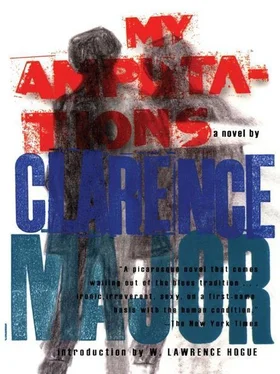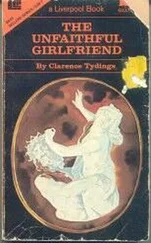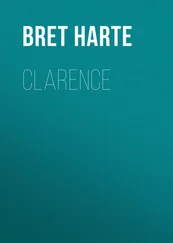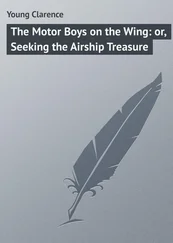Clarence Major - My Amputations
Здесь есть возможность читать онлайн «Clarence Major - My Amputations» весь текст электронной книги совершенно бесплатно (целиком полную версию без сокращений). В некоторых случаях можно слушать аудио, скачать через торрент в формате fb2 и присутствует краткое содержание. Год выпуска: 2008, Издательство: Fiction Collective 2, Жанр: Современная проза, на английском языке. Описание произведения, (предисловие) а так же отзывы посетителей доступны на портале библиотеки ЛибКат.
- Название:My Amputations
- Автор:
- Издательство:Fiction Collective 2
- Жанр:
- Год:2008
- ISBN:нет данных
- Рейтинг книги:5 / 5. Голосов: 1
-
Избранное:Добавить в избранное
- Отзывы:
-
Ваша оценка:
- 100
- 1
- 2
- 3
- 4
- 5
My Amputations: краткое содержание, описание и аннотация
Предлагаем к чтению аннотацию, описание, краткое содержание или предисловие (зависит от того, что написал сам автор книги «My Amputations»). Если вы не нашли необходимую информацию о книге — напишите в комментариях, мы постараемся отыскать её.
My Amputations — читать онлайн бесплатно полную книгу (весь текст) целиком
Ниже представлен текст книги, разбитый по страницам. Система сохранения места последней прочитанной страницы, позволяет с удобством читать онлайн бесплатно книгу «My Amputations», без необходимости каждый раз заново искать на чём Вы остановились. Поставьте закладку, и сможете в любой момент перейти на страницу, на которой закончили чтение.
Интервал:
Закладка:
Mason, early in life, got slapped in the face by the unmistakable separation of Church and State. Hard-headedness made the hit come easily and irreversibly: his “innocence” became irrecoverable: he'd traded it in for an existential shot in the dark: A bidet was not a toilet without a seat; whores didn't necessarily kiss better than housewives; but… yeah, you're getting warm (take your time — as Mississippi Fred McDowell used to say: time, time…), even hot: keep the Clean (Church) separate from the Dirty (State). Point: early Mason lost faith in both . Remember, he was a rat from the get-go. The separation itself: his stepfather, for example, never taught him anything except the separation part: his sensibility was a peephole through which you could see frost gathering on military sternness. He polished his old army boots every Saturday morning although he'd been discharged twenty years before: spit-shined, spotless dude, he was, who chopped beef, not pork, not lamb, for Swift's at the stockyards. Could barely write his name: connected crudely printed letters with cross-bars: was not visibly intelligent either: just noble — full of nobility. Mason's mother caught her bottom lip between her teeth and chewed on it thoughtfully: held it that way, puzzled by the demands of the Church on one side (forced connections?) and the State on the other: that lasted for two, no, two and a half years. Mason's youngest sister, Maureen (never thought of her as half ), was the offspring of that civil wedding made holy between Wilbur Young, The Man of Rules, and Melba, Woman of Blues. In six months he'd be fourteen: after school Mason walked to the cleaners — Rapid Magic Delux — his mother and stepfather owned on Forty-Fourth and Langley, South Side. It was December — it had snowed heavily three days before: snow now muddy, slush. He had the sniffles, a runny nose, chills. His pea jacket, though warm, had no buttons. When he entered Rapid Magic he saw Melba — thin, chilled, with folded arms, walking toward the pressing-machine, barefoot. At first glance nothing seemed unusual. As Mason went behind the counter, Melba turned and came toward him. He knew instantly: something was wrong: her eyes: it showed in her eyes: they'd never been that way before: they were, how d'ya say, blank crazy…! He spoke: “Are you all right?” She gave him a glazed look — unfocused… His mother didn't know him. He felt shot-through-the-grease. Mason watched his mother count the money in the cash register; then she wrote down the total on a scrap of paper alongside the machine. He stood at her side: she'd already totalled the same amount eight times on the same sheet. Had she forgotten? Obsessive fear of—? Mason's fear raced out of him, flapping, bloody, like a rooster with its head just chopped off. He felt desperation: a mindless mother meant being at the mercy of The Man of Rules. As usual, Mr. Young left his gig at Swift's at five, got to Rapid Magic at quarter-to-six. He normally ran the deliveries in his old car. Today when he came in, he casually spoke to his wife — who didn't return the greeting, didn't seem to recognize him — then turned to the boy who was pretending to read Catcher in the Rye. Mason quickly put his book aside, seeing that his stepfather hadn't even noticed the change in Melba: Mister Rules was busy gathering garments for delivery. Mason went to him. “Mister Young” (they were that formal) “uh, mother is… there's something wrong with her… ” Young continued to sort through dresses, suits, jackets, slacks on the rack, separating them by address, street, city section. Young said nothing. (Melba, though able to hear this conversation — she was perched on the high stool by the cash register — was clearly not hearing it.) Then without looking at the boy, Young spoke: “Get the bucket and mop. The floor is dirty.” Mason, tenderfoot, foolish, didn't get the connection, he stood there with his mouth agape. “But—” “ I said get —” Young turned his violent deadfish-eyes on Mason — the skin of his thick, bulldog face, which was the color of potato skin, sunk to a splurgy purple-brown. Mason wiped a tear — which tasted like salt-pork — out of the corner of his mouth. “But look at her!” Young raised his hand, as though ready to strike. Mason turned and ran to the toilet at the back of the shop where the mop and bucket were stored. Trapped, framed, he filled the bucket at the sink, dumped Liquid Magic from its plastic bottle into the water. He was sobbing. Taking his equipment out by the pressing machine, he dropped the mop, then lifted the bucket with both hands and threw its contents across the shop, on Young and the garments he was fussing with. Before Young could respond, Mason ran out the back door, dashing through the smelly gangway, he reached South Parkway (later called Martin Luther King Drive); and it was while running, as though carrying the pigskin of his future tightly gripped under his arm, that he had a vision: Celt CuRoi would guide him firmly from the middle ground of separation sprawled there between Church and State. He would not fumble — would kickoff with skill unbound: would not need the protection of anybody else — ever. It was midnight before he climbed the steep stairway of the apartment building at Church Avenue and State Street where the family lived in Apartment C.
But it was only a vision. Before long, in Cheyenne, on an Air Force base, he sat at a typewriter. Knocked up girls floated through the balloon of his thinkbox. In high he'd already impregnated three or four fast members of The Jailbait Society. Each night now, while asleep, Pony Express gallopers brought him summons to appear in civil court to answer contributing-to-juvenile-delinquency and bastardy charges. It was hard to get up early enough to be there on time. He couldn't get permission to leave the base. Meanwhile, he was trying for a kind of literary apprenticeship. Mason's apprenticeship started like this: after reading and imitating Dumas, Dickens, Conrad, Baudelaire, Rimbaud, Verlaine, Zola, there were Richard Wright, Gertrude Stein, Ellison, Baldwin, Himes, Toomer, Hemingway, Faulkner. Yes, yes —Faulkner! Well, you know old Joe Bullock, Jr., the guy who cut his girl's throat and threw her body out back behind the shed? (The yella girl story was the one Mason could hear — not just in Faulkner, in Stein, in Toomer! his mother was one too.) Yella was a waitress in a greasy-spoon in 1921. They made her wear a hairnet. Joe thought she was stepping out with John the white boss. Scribner's turned down their attempt to make their story known to the public. That was in 1930. American Mercury published it in 1931 under a title the town leaders later changed — by forcing previously unknown connections. It all went back before the fury and in some of the early versions you could hear at the redneck barbershop or general store (where old white men spat tobacco juice into the flame in the stove) in the winter: Yella was a decent young woman, not just a part-time colored (Faulkner would've said “nigger”) prostitute: More to her life than contrast of southern grotesque and racial irony: more than fear and hopelessness. A boy, Bobby Joe, went about telling the story from his own point-of-view. People liked his version. Mason learned about first-person-plural from it. H.L. Mencken, however, cut the “white” baby out of Yella's womb before revealing her story to the public. While here nearly freezing in the snow and filing military documents at Stock Records, Mason made an earnest attempt to write. Results? I clear my throat.
What — fifty-five, fifty-six? One instructor was screwing one of the enlisted women — a blonde, sort of fat and dumb. They'd do it each morning before class: they'd arrive an hour and a half early — screw in the dark classroom on the floor and by the time the rest of them got there blondie'd have her hair combed, clothes back on but she'd always smell of sweat and sperm and her cheeks and earlobes would be sending out crimson signals. All the other guys, Mason too, felt it in the groin. Imagination was a bitch. They were all just a bunch of lonely Cheyenne cowboys. Mason was a devil of a guy in an early morning outfit, a dreamer of sex frames, a drinker in base beerhalls. Rumor was they were all being fed saltpeter anyway: desire was supposed to be undercover, like winter roots under a blanket of Wyoming snow. Mason sent his little sister, Maureen, a leather cowgirl dress, with frills, bells. Melba wrote: “Gwen gone wild. Lord, save us. Glad you're in the service. The checks I get help a lot. Any chance of re-enlisting?” Church and State matters: exchange and conflict: still strong back yonder in Chitown. Mason was not homesick though. At the same time he was becoming aware of something else: he was going to die: sometime. This was a pain in the ass; got his quills up: he'd surely miss out on some important moment up there in the cooking-with-gas future. Attaboy! — but rotten luck, eh? He was nearly twenty-one and as Gide said after that it's all downhill. Clara Downhill — wasn't that her name? South Side. Big sister Gwen… into drugs and booze, who knows whatall, living life in the fast lane: turning out like Clara Downhill, all the rest. This was Mason's reprieve? Had he bought the ghetto system, could he change…? Well, he thought he wasn't going to have his balls hung from the church bell and his brains splattered all over the courthouse lawn. He thought he'd write his way out. After Cheyenne, he'd be carted off to Valdosta, Georgia: Monkeyshit! On the way he visited Chiro whose eyes were bloodshot, yellow, red, gray. Mason's father's fingers and feet were swollen with disease. Mason cried up to night stars — a bull's bellow — in sadness and rage… In three days he was just north of Florida — where runaway slaves once established a human community (“state”? “nation”?) — stepping down from the hot, grimy train, at Valdosta. (Why were so many black guys from the North assigned to these southern backwoods…? where they were afraid to go into the towns filled with rednecks.) Yet in all fairness to poor Mason, we must observe the contents of his sadness: it was a team of butterflies galloping and snorting like sweating, wild horses. One Saturday night, he and a couple of other brave dudes caught the bus to town— anyway . First person met was an old black man weeping on street corner. Reason? Daughter'd just been thrown from a police car — she lay at his feet, bleeding — after being gang-raped by a squad of fat, red-faced cops assigned to the “nigger section.” Mason, Churchy and Dossy O got a colored lady — driving by — to take the girl to a midwife (—no hospital for black people). It was dusk, Jean Toomer dusk. Red dirt. Half moon. The whole bit. Fishfry in back of an old house that resembled a burnt elephant, a cat house. Mason's fear: skulls with black skin stretched across them were drying in moonlight. But the fishfry was for fun — wasn't it? Huh ? Yellow electric lights — night bugs — strung above blue-silver smoke and the hot steam from black cooking kettles, grills with years of red Bar-B-Q sauce blackened to their racks… Smells mingled: tangy innards, catfish, sizzling ribs of pork. You could hear the chicken backs and wings, gizzards, thighs, legs, popping their grease. Everybody was happy. Dancing. Louis Jordan rippling through “Saturday Night Fish Fry”: from the record player on the back porch plugged-in in the kitchen. Mason, too, felt good — at the edge of anger, though, and Richard Wright-fear. Agony, really. The flesh of a mature sheep? He could eat more than mutton. His hunger was gigantic! Was that a sheep or a pig on the spit? He felt the presence of Celt here, just above him — like a winged siren. He, a griffin. And Chiro, too — at least in spirit: because of Jordan and Mason's memory of his father's, “ Hot dog ! Listen to them keys—” Sweet, sad legacy—“Ain't nobody here but us chickens!” And here one could be one's self: even if population was being checked by murder just beyond. People glazed in warm sweat were doing the bebop-touched Boogie-Woogie, crying, “Hi de hi de hooo-hoo!” and dudes sporting the hip Billy Eckstine rolled-collar — in powder blue or butterfly yellow. Cab? He was always there as background. You bet. Mason held the legacy like an instrument, a relic passed down so the warriors of the enemies could not see it: part of his survival equipment, his force. Yet he defied the cliché: he couldn't strut his stuff, point a toe, tap: not then: too self-conscious, stiff. He watched the others with Bar-B-Q sauce on their chins — licking the last drops from their fingers—; watched from warm shadows, warm and wet; drank white lightnin' as they stepped to the rhythms, inside them, defying and obeying them. The shy young women and men, wallflowers like himself, smelled of lye soap in their cheap cotton summer clothes newly bought that morning at the dime store. Unlike the black women in southern literature these real women didn't “laugh easily, with deep-throated pleasure,” rather, they smiled gently like Jean Toomer's mysterious, dark and light, sad, women. Everybody had a country hip-walk. Mezz. But the food ran low, got cold, the sauce achieved its crusty lardlike surface, the hips — real ones — felt tired, eyelids ached, night lights filled with bugs, even the music got sluggish. It was after midnight and everybody was either ready for love action or sleep. The last bus to the base — a dragon designed to fly one above danger — would leave in five minutes. Hubba hubba! The three comrades checked their Timexes and got the “Last Bus Blues.” As they ran their heritage music chased through cobwebs of their headflesh: Burgundy Street, Canal Street, Clark and Randolph, Decatur Street, Beal: “You Got The Right Key But The Wrong Key Hole,” “It's Tight Like That,” “Barb Wire Blues,”—ol' Georgia Tom, them Mound City Blues Blowers, ah, and… They leaped into a trot, self-consciously keeping a city cool in the sticks: a new form of manhood. At a lighted corner a cop car stopped, dark like a hearse without lights. Two gray faces, swollen from beer, glared at them. Lights flashed. Sirens went up like a flock of gannets — only harder. Cops looked very moral — and fictitious (many years later Mason would swear the Moral Majority and Moral Fiction deserved each other). The car jerked forward and shot fast toward them — flying onto the sidewalk. Realism? Not really: spaceships were more impressive. It stopped before the guys. The car radio — just a touch of profound irony, huh — was playing “Ah Leu Cha,” by Bird straight from Radio Free Europe. But there was some thing else coming from that car radio: the car hemmed our guys against a greasy showcase glass behind which monkeys on sticks and paper whistles were suspended on strings. Mason feared death. Like Bob Crosby's Bob Cats, Mason wanted to do a “Big Foot Jump.” Now folks, you know brown or black folk running had to be guilty. They'd forgotten — in their haste: with only five minutes. (“I know I am guilty but what is my crime?”) The cops, with their huge pistols already drawn, got out. “Against the wall, niggers.” The heroes obeyed. Were these the rapists? With hands against cold glass, legs spread, Mason felt his balls swing inside his Jockey shorts. Mason got a closer look at the showcase: Tom Mix smiled from a Bubble Gum showcard, a model airplane — on a piece of thread — was about to enter a thunderstorm filled with lightning, taking off from, ah shit, who knows where … Mason — and the others — felt the thick rough insensitive hands, searching for… knives? They never had knives. What a cliché. “You niggers from the base? What's the hurry?” The bus was coming now — filled with ugly light. It went by.
Читать дальшеИнтервал:
Закладка:
Похожие книги на «My Amputations»
Представляем Вашему вниманию похожие книги на «My Amputations» списком для выбора. Мы отобрали схожую по названию и смыслу литературу в надежде предоставить читателям больше вариантов отыскать новые, интересные, ещё непрочитанные произведения.
Обсуждение, отзывы о книге «My Amputations» и просто собственные мнения читателей. Оставьте ваши комментарии, напишите, что Вы думаете о произведении, его смысле или главных героях. Укажите что конкретно понравилось, а что нет, и почему Вы так считаете.












